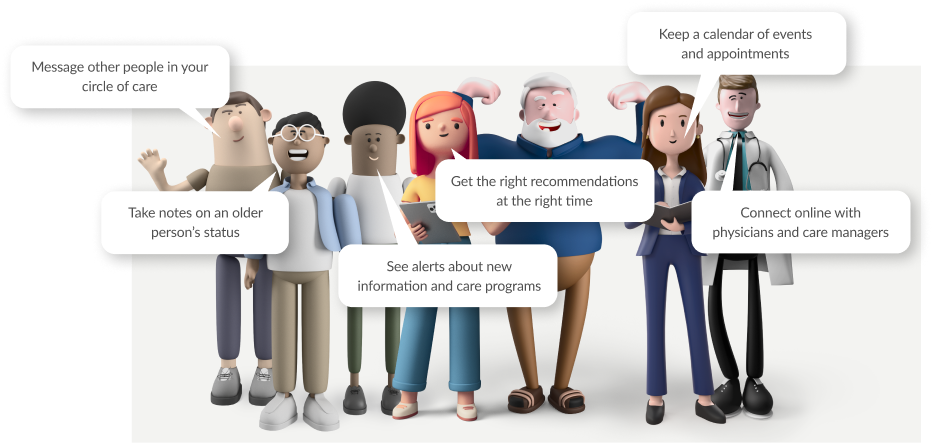Reviewing driving regulations and legal risks
Summary
Driving at an advanced age brings a host of challenges, including potentially higher insurance rates, more monitoring by state licensing boards, and legal risks. This article outlines some of the legal and financial regulations to consider when advising an older driver. Each state has different regulations, so make sure to check with the appropriate department of motor vehicles for the most accurate information.
Are adult children responsible for their parents’ traffic mishaps?
For the most part, adult children will probably not be liable for parents’ traffic mishaps. If the driver has an active driver’s license and is driving a car registered under their name, it’s unlikely that their adult children will be criminally or financially responsible. There are some significant exceptions, though.
- The accident happened in your car. If the driver was operating a vehicle registered in your name, you might be financially responsible for any accidents or damage caused.
- You knowingly allowed someone to drive despite a health or cognitive problem. If you were aware that a person was an imminent threat on the road but allowed them to drive anyway, you might suffer some repercussions. It is extremely rare, but it is possible that if you knew that your loved one had suffered a recent dramatic change in their driving ability and did not try to stop them, you could be held liable.
- You were aware of a medical impairment and did not report it to the department of motor vehicles. This is not true in every state. However, it is possible that failure to report a known impairment will result in penalties.
Should you worry about lawsuits from traffic accidents?
A person might carry a very high premium on their auto insurance policy, or carry the bare minimum of coverage, on the reasoning that they drive so infrequently it shouldn’t be a problem. Then, after an accident or property damage, a lawsuit appears that could be financially devastating. Each person’s needs are different, and each state and insurance policy is different. Make sure you’re aware of the auto policy and have talked to the person about fallback plans in case of lawsuits.
Does the state automatically remove older drivers’ licenses?
Currently, no states will automatically rescind driver licenses, no matter the age; however, more than 30 states have age-related provisions, ranging from required in-person renewal to required vision tests. These regulations are designed to keep drivers safe on the road but not to discriminate solely based on age.
What are some renewal requirements for older drivers?
Each state defines “older driver” differently, and each state has its own requirements for older drivers renewing or applying for licenses. These are some of the most common renewal requirements for older drivers.
- In-person testing. Some states require license renewal to take place in person at the department of motor vehicles, or will only allow mail-in or online renewal every second renewal period.
- Fewer years between renewals. Other states shorten the time between license renewal periods after a certain age.
- Required vision test. One common restriction for older drivers is a vision test, either at the department of motor vehicles or through a licensed ophthalmologist or optometrist, within a certain time limit.
- Required road test. Some states require road driving tests with a DMV representative after a certain age in order to renew a driver’s license.
- Medical advisory board recommendations. Some states have medical advisory boards or panels that work with the DMV to monitor drivers and driving policy. Very rarely, individual cases will go to these boards for review.
What are some restrictions on licenses for older drivers?
Just as some drivers’ licenses state that they need corrective lenses to drive, some states place specific restrictions on older drivers who have medical or mental reasons for the restrictions.
- No freeway driving. Drivers may be limited to the type of road they may drive on, or to a maximum speed limit.
- No night driving. Because of changes to eyesight as they age, many older drivers suffer from night vision loss and are restricted to daylight-only driving.
- Geographic restrictions. This could mean either allowing driving only a certain number of miles from home, or on certain types of roads—for example, no busy city streets.
- Time of day restrictions. For many older drivers, the bustle and fast pace of rush hour traffic is simply too much to handle. Their driving hours may be restricted to keep them off the road at these dangerous times, preventing accidents caused by slower reflexes.
- Additional mirrors or modifications. Turning to see the blind spot can be physically challenging, so states may require changes to sideview mirrors to improve blind spot visibility.
- Physical supports required. Cushions, pads, or booster seats can provide the proper driving position for drivers with mobility or strength problems.
- Bioptic lenses. To improve declining vision, especially for night driving, doctors may prescribe these special glasses to aid drivers. Some states require additional vision tests before allowing bioptic driving.1
Related information
Arranging for and conducting a formal driving assessment
Cognitive impairment, dementia, and driving
Curtailing unsafe driving habits
Getting help with an unsafe driver
Modifying driving habits of older adults
Physically limiting vehicle access for unsafe drivers
Unsafe driving warning signs
